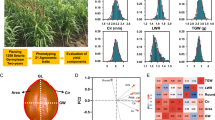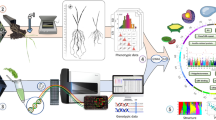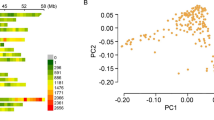Abstract
Progressive decline in irrigation water is forcing farmers to use brackish water which increases soil salinity and exposes the crop plants to salinity. Maize, one of the most important crops, is sensitive to salinity. Salt tolerance is a complex trait controlled by a number of physiological and biochemical processes. Scant information is available on the genetic architecture of salt tolerance in maize. We evaluated 399 inbred lines for six early vigor shoot and root traits upon exposure of 18-day seedlings to salinity (ECiw = 16 dS m-1) stress. Contrasting response of shoot and root growth to salinity indicated a meticulous reprogramming of resource partitioning by the plants to cope with the stress. The genomic analysis identified 57 single nucleotide polymorphisms (SNP) associated with early vigor traits. Candidate genes systematically associated with each SNP include both previously known and novel genes. Important candidates include a late embryogenesis protein, a divalent ion symporter, a proton extrusion protein, an RNA-binding protein, a casein kinase 1, and an AP2/EREBP transcription factor. The late embryogenesis protein is associated with both shoot and root length, indicating a coordinated change in resource allocation upon salt stress. Identification of a casein kinase 1 indicates an important role for Ser/Thr kinases in salt tolerance. Validation of eight candidates based on expression in a salt-tolerant and a salt-sensitive inbred line supported their role in salt tolerance. The candidate genes identified in this investigation provide a foundation for dissecting genetic and molecular regulation of salt tolerance in maize and related grasses.






Similar content being viewed by others
References
Acosta-Motos JR, Ortuño MF, Álvarez S, López-Climent MF, Gómez-Cadenas A, Sánchez-Blanco MJ (2016) Changes in growth, physiological parameters and the hormonal status of Myrtus communis L. plants irrigated with water with different chemical compositions. J Plant Physiol 191:12–21. https://doi.org/10.1016/j.jplph.2015.11.010
Andorf CM, Cannon EK, Portwood IIJL, Gardiner JM, Harper LC, Schaeffer ML, Braun BL, Campbell DA, Vinnakota AG, Sribalusu VV, Huerta M, Cho KT, Wimalanathan K, Richter JD, Mauch ED, Rao BS, Birkett SM, Sen TZ, Lawrence-Dill CJ (2016) MaizeGDB update: new tools, data and interface for the maize model organism database. Nucleic Acids Res 44:D1195–D1201. https://doi.org/10.1093/nar/gkv1007
Artur MAS, Zhao T, Ligterink W, Schranz E, Hilhorst HWM (2018) Dissecting the genomic diversification of late embryogenesis abundant (LEA) protein gene families in plants. Genome Biol Evol 11:459–471. https://doi.org/10.1093/gbe/evy248
Battaglia M, Covarrubias A (2013) Late embryogenesis abundant (LEA) proteins in legumes. Front Plant Sci 4. https://doi.org/10.3389/fpls.2013.00190
Blanvillain R, Kim JH, Wu S, Lima A, Ow DW (2009) OXIDATIVE STRESS 3 is a chromatin-associated factor involved in tolerance to heavy metals and oxidative stress. Plant J 57:654–665. https://doi.org/10.1111/j.1365-313X.2008.03717.x
Buckler ES, Holland JB, Bradbury PJ, Acharya CB, Brown PJ, Browne C, Ersoz E, Flint-Garcia S, Garcia A, Glaubitz JC, Goodman MM, Harjes C, Guill K, Kroon DE, Larsson S, Lepak NK, Li H, Mitchell SE, Pressoir G, Peiffer JA, Rosas MO, Rocheford TR, Romay MC, Romero S, Salvo S, Villeda HS, Sofia da Silva H, Sun Q, Tian F, Upadyayula N, Ware D, Yates H, Yu J, Zhang Z, Kresovich S, McMullen MD (2009) The genetic architecture of maize flowering time. Science 325:714–718. https://doi.org/10.1126/science.1174276
Campbell MT, Bandillo N, Al Shiblawi FRA, Sharma S, Liu K, Du Q, Schmitz AJ, Zhang C, Véry A-A, Lorenz AJ, Walia H (2017) Allelic variants of OsHKT1;1 underlie the divergence between indica and japonica subspecies of rice (Oryza sativa) for root sodium content. PLoS Genet 13:e1006823. https://doi.org/10.1371/journal.pgen.1006823
Cui D, Wu D, Somarathna Y, Xu C, Li S, Li P, Zhang H, Chen H, Zhao L (2015) QTL mapping for salt tolerance based on snp markers at the seedling stage in maize (Zea mays L.). Euphytica 203:273–283. https://doi.org/10.1007/s10681-014-1250-x
de Azevedo Neto AD, Prisco JT, Enéas-Filho J, CEBd A, Gomes-Filho E (2006) Effect of salt stress on antioxidative enzymes and lipid peroxidation in leaves and roots of salt-tolerant and salt-sensitive maize genotypes. Environ Exp Bot 56:87–94. https://doi.org/10.1016/j.envexpbot.2005.01.008
Diepenbrock CH, Kandianis CB, Lipka AE, Magallanes-Lundback M, Vaillancourt B, Góngora-Castillo E, Wallace JG, Cepela J, Mesberg A, Bradbury PJ, Ilut DC, Mateos-Hernandez M, Hamilton J, Owens BF, Tiede T, Buckler ES, Rocheford T, Buell CR, Gore MA, DellaPenna D (2017) Novel loci underlie natural variation in vitamin E levels in maize grain. Plant Cell 29:2374. https://doi.org/10.1105/tpc.17.00475
Farooq M, Hussain M, Wakeel A, Siddique KHM (2015) Salt stress in maize: effects, resistance mechanisms, and management. A review. Agron Sustain Dev 35:461–481. https://doi.org/10.1007/s13593-015-0287-0
Federer WT, Raghavarao D (1975) On augmented designs. Biometrics 31:29–35. https://doi.org/10.2307/2529707
Flowers TJ (2004) Improving crop salt tolerance. J Exp Bot 55:307–319. https://doi.org/10.1093/jxb/erh003
Fortmeier R, Schubert S (1995) Salt tolerance of maize (Zea mays L.): the role of sodium exclusion. Plant Cell Environ 18:1041–1047. https://doi.org/10.1111/j.1365-3040.1995.tb00615.x
Franco JA, Martínez-Sánchez JJ, Fernández JA, Bañón S (2006) Selection and nursery production of ornamental plants for landscaping and xerogardening in semi-arid environments. J Hortic Sci Biotechnol 81:3–17. https://doi.org/10.1080/14620316.2006.11512022
Gomez-Bellot MJ, Alvarez S, Castillo M, Banon S, Ortuno MF, Sanchez-Blanco MJ (2013) Water relations, nutrient content and developmental responses of Euonymus plants irrigated with water of different degrees of salinity and quality. J Plant Res 126:567–576. https://doi.org/10.1007/s10265-012-0545-z
Hanin M, Ebel C, Ngom M, Laplaze L, Masmoudi K (2016) New insights on plant salt tolerance mechanisms and their potential use for breeding. Front Plant Sci 7:1787. https://doi.org/10.3389/fpls.2016.01787
He S, Tan L, Hu Z, Chen G, Wang G, Hu T (2012) Molecular characterization and functional analysis by heterologous expression in E. coli under diverse abiotic stresses for OsLEA5, the atypical hydrophobic LEA protein from Oryza sativa L. Mol Gen Genomics 287:39–54. https://doi.org/10.1007/s00438-011-0660-x
Hirsch CN, Foerster JM, Johnson JM, Sekhon RS, Muttoni G, Vaillancourt B, Peñagaricano F, Lindquist E, Pedraza MA, Barry K, de Leon N, Kaeppler SM, Buell CR (2014) Insights into the maize pan-genome and pan-transcriptome. Plant Cell 26:121–135
Hua D, Wang C, He J, Liao H, Duan Y, Zhu Z, Guo Y, Chen Z, Gong Z (2012) A plasma membrane receptor kinase, GHR1, mediates abscisic acid- and hydrogen peroxide-regulated stomatal movement in Arabidopsis. Plant Cell 24:2546. https://doi.org/10.1105/tpc.112.100107
Jamil A, Riaz S, Ashraf M, Foolad MR (2011) Gene expression profiling of plants under salt stress. Crit Rev Plant Sci 30:435–458. https://doi.org/10.1080/07352689.2011.605739
Jia F, Qi S, Li H, Liu P, Li P, Wu C, Zheng C, Huang J (2014) Overexpression of Late Embryogenesis Abundant 14 enhances Arabidopsis salt stress tolerance. Biochem Biophys Res Commun 454:505–511. https://doi.org/10.1016/j.bbrc.2014.10.136
Kaur R, Singh K, Singh J (2013) A root-specific wall-associated kinase gene, HvWAK1, regulates root growth and is highly divergent in barley and other cereals. Funct Integr Genomics 13:167–177. https://doi.org/10.1007/s10142-013-0310-y
Kersey PJ, Allen JE, Allot A, Barba M, Boddu S, Bolt BJ, Carvalho-Silva D, Christensen M, Davis P, Grabmueller C, Kumar N, Liu Z, Maurel T, Moore B, McDowall MD, Maheswari U, Naamati G, Newman V, Ong CK, Paulini M, Pedro H, Perry E, Russell M, Sparrow H, Tapanari E, Taylor K, Vullo A, Williams G, Zadissia A, Olson A, Stein J, Wei S, Tello-Ruiz M, Ware D, Luciani A, Potter S, Finn RD, Urban M, Hammond-Kosack KE, Bolser DM, De Silva N, Howe KL, Langridge N, Maslen G, Staines DM, Yates A (2017) Ensembl Genomes 2018: an integrated omics infrastructure for non-vertebrate species. Nucleic Acids Res 46:D802–D808. https://doi.org/10.1093/nar/gkx1011
Lander E, Kruglyak L (1995) Genetic dissection of complex traits: guidelines for interpreting and reporting linkage results. Nat Genet 11:241–247. https://doi.org/10.1038/ng1195-241
Li M-X, Yeung JMY, Cherny SS, Sham PC (2012) Evaluating the effective numbers of independent tests and significant p-value thresholds in commercial genotyping arrays and public imputation reference datasets. Hum Genet 131:747–756. https://doi.org/10.1007/s00439-011-1118-2
Li Y-X, Li C, Bradbury PJ, Liu X, Lu F, Romay CM, Glaubitz JC, Wu X, Peng B, Shi Y, Song Y, Zhang D, Buckler ES, Zhang Z, Li Y, Wang T (2016) Identification of genetic variants associated with maize flowering time using an extremely large multi-genetic background population. Plant J 86:391–402. https://doi.org/10.1111/tpj.13174
Lipka AE, Tian F, Wang Q, Peiffer J, Li M, Bradbury PJ, Gore MA, Buckler ES, Zhang Z (2012) GAPIT: genome association and prediction integrated tool. Bioinformatics 28:2397–2399. https://doi.org/10.1093/bioinformatics/bts444
Liu H, Wang X, Zhang H, Yang Y, Ge X, Song F (2008) A rice serine carboxypeptidase-like gene OsBISCPL1 is involved in regulation of defense responses against biotic and oxidative stress. Gene 420:57–65. https://doi.org/10.1016/j.gene.2008.05.006
Luo M, Zhao Y, Zhang R, Xing J, Duan M, Li J, Wang N, Wang W, Zhang S, Chen Z, Zhang H, Shi Z, Song W, Zhao J (2017) Mapping of a major QTL for salt tolerance of mature field-grown maize plants based on SNP markers. BMC Plant Biol 17:140–140. https://doi.org/10.1186/s12870-017-1090-7
Luo X, Wang B, Gao S, Zhang F, Terzaghi W, Dai M (2019) Genome-wide association study dissects the genetic bases of salt tolerance in maize seedlings. J Integr Plant Biol 61:658–674. https://doi.org/10.1111/jipb.12797
Maas EV, Hoffman GJ (1977) Crop salt tolerance - current assessment. J Irrig Drain Div, Am Soc Civ Enh [ZDB] 103:115–134
Marchler-Bauer A, Bryant SH (2004) CD-Search: protein domain annotations on the fly. Nucleic Acids Res 32:W327–W331. https://doi.org/10.1093/nar/gkh454%JNucleicAcidsResearch
Marchler-Bauer A, Bo Y, Han L, He J, Lanczycki CJ, Lu S, Chitsaz F, Derbyshire MK, Geer RC, Gonzales NR, Gwadz M, Hurwitz DI, Lu F, Marchler GH, Song JS, Thanki N, Wang Z, Yamashita RA, Zhang D, Zheng C, Geer LY, Bryant SH (2016) CDD/SPARCLE: functional classification of proteins via subfamily domain architectures. Nucleic Acids Res 45:D200–D203. https://doi.org/10.1093/nar/gkw1129
Martí MC, Stancombe MA, Webb AAR (2013) Cell- and stimulus type-specific intracellular free Ca2+ signals in Arabidopsis. Plant Physiol 163:625. https://doi.org/10.1104/pp.113.222901
Mazaheri M, Heckwolf M, Vaillancourt B, Gage JL, Burdo B, Heckwolf S, Barry K, Lipzen A, Ribeiro CB, Kono TJY, Kaeppler HF, Spalding EP, Hirsch CN, Buell CR, de Leon N, Kaeppler SM (2019) Genome-wide association analysis of stalk biomass and anatomical traits in maize. BMC Plant Biol 19:45. https://doi.org/10.1186/s12870-019-1653-x
McMullen MD, Kresovich S, Villeda HS, Bradbury P, Li H, Sun Q, Flint-Garcia S, Thornsberry J, Acharya C, Bottoms C, Brown P, Browne C, Eller M, Guill K, Harjes C, Kroon D, Lepak N, Mitchell SE, Peterson B, Pressoir G, Romero S, Rosas MO, Salvo S, Yates H, Hanson M, Jones E, Smith S, Glaubitz JC, Goodman M, Ware D, Holland JB, Buckler ES (2009) Genetic properties of the maize nested association mapping population. Science 325:737–740. https://doi.org/10.1126/science.1174320
Mikel MA, Dudley JW (2006) Evolution of North American dent corn from public to proprietary germplasm. Crop Sci 46:1193–1205. https://doi.org/10.2135/cropsci2005.10-0371
Morton MJL, Awlia M, Al-Tamimi N, Saade S, Pailles Y, Negrão S, Tester M (2019) Salt stress under the scalpel – dissecting the genetics of salt tolerance. Plant J 97:148–163. https://doi.org/10.1111/tpj.14189
Munns R, Termaat A (1986) Whole-plant responses to salinity. Funct Plant Biol 13:143–160. https://doi.org/10.1071/PP9860143
Munns R, Tester M (2008) Mechanisms of salinity tolerance. Annu Rev Plant Biol 59:651–681. https://doi.org/10.1146/annurev.arplant.59.032607.092911
Munns R, Husain S, Rivelli AR, James RA, Condon AGT, Lindsay MP, Lagudah ES, Schachtman DP, Hare RA (2002) Avenues for increasing salt tolerance of crops, and the role of physiologically based selection traits. In: Horst WJ, Bürkert A, Claassen N, Flessa H, Frommer WB, Goldbach H, Merbach W, Olfs HW, Römheld V, Sattelmacher B, Schmidhalter U, Schenk MK, Wirén NV (eds) Progress in plant nutrition: plenary lectures of the XIV International Plant Nutrition Colloquium: food security and sustainability of agro-ecosystems through basic and applied research. Springer Netherlands, Dordrecht, pp 93–105
Negrão S, Schmöckel SM, Tester M (2017) Evaluating physiological responses of plants to salinity stress. Ann Bot 119:1–11. https://doi.org/10.1093/aob/mcw191
Nepolean T, Kaul J, Mukri G, Mittal S (2018) Genomics-enabled next-generation breeding approaches for developing system-specific drought tolerant hybrids in maize. Front Plant Sci 9:361. https://doi.org/10.3389/fpls.2018.00361
Pfaffl MW (2004) Quantification strategies in real-time PCR. In: Bustin SA (ed) A-Z of quantitative PCR. International University Line (IUL), La Jolla, pp 87–112
Roy SJ, Negrão S, Tester M (2014) Salt resistant crop plants. Curr Opin Biotechnol 26:115–124. https://doi.org/10.1016/j.copbio.2013.12.004
Saade S, Maurer A, Shahid M, Oakey H, Schmöckel SM, Negrão S, Pillen K, Tester M (2016) Yield-related salinity tolerance traits identified in a nested association mapping (NAM) population of wild barley. Sci Rep 6:32586. https://doi.org/10.1038/srep32586
Sandhu D, Kaundal A (2018) Dynamics of salt tolerance: molecular perspectives. In: Gosal SS, Wani SH (eds) Biotechnologies of Crop Improvement, Volume 3: Genomic Approaches. Springer International Publishing, Cham, pp 25–40
Sandhu D, Cornacchione MV, Ferreira JF, Suarez DL (2017) Variable salinity responses of 12 alfalfa genotypes and comparative expression analyses of salt-response genes. Sci Rep 7:42958. https://doi.org/10.1038/srep42958
Sandhu D, Pudussery MV, Kaundal R, Suarez DL, Kaundal A, Sekhon RS (2018) Molecular characterization and expression analysis of the Na+/H+ exchanger gene family in Medicago truncatula. Funct Integr Genomics 18:141–153. https://doi.org/10.1007/s10142-017-0581-9
Sekhon RS, Saski C, Kumar R, Flinn B, Luo F, Beissinger TM, Ackerman AJ, Breitzman MW, Bridges WC, de Leon N, Kaeppler SM (2019) Integrated genome-scale analysis identifies novel genes and networks underlying senescence in maize. Plant Cell. https://doi.org/10.1105/tpc.18.00930
Shrivastava P, Kumar R (2015) Soil salinity: a serious environmental issue and plant growth promoting bacteria as one of the tools for its alleviation. Saudi J Biol Sci 22:123–131. https://doi.org/10.1016/j.sjbs.2014.12.001
Sun Y, Mu C, Zheng H, Lu S, Zhang H, Zhang X, Liu X (2018) Exogenous Pi supplementation improved the salt tolerance of maize (Zea mays L.) by promoting Na+ exclusion. Sci Rep 8:16203–16203. https://doi.org/10.1038/s41598-018-34320-y
Ummenhofer CC, Xu H, Twine TE, Girvetz EH, McCarthy HR, Chhetri N, Nicholas KA (2015) How climate change affects extremes in maize and wheat yield in two cropping regions. J Clim 28:4653–4687. https://doi.org/10.1175/jcli-d-13-00326.1
Wang W, Vinocur B, Altman A (2003) Plant responses to drought, salinity and extreme temperatures: towards genetic engineering for stress tolerance. Planta 218:1–14. https://doi.org/10.1007/s00425-003-1105-5
Wang C, Xu W, Jin H, Zhang T, Lai J, Zhou X, Zhang S, Liu S, Duan X, Wang H, Peng C, Yang C (2016) A putative chloroplast-localized Ca2+/H+ antiporter CCHA1 is involved in calcium and pH homeostasis and required for PSII function in Arabidopsis. Mol Plant 9:1183–1196. https://doi.org/10.1016/j.molp.2016.05.015
Wang M, Wang Y, Zhang Y, Li C, Gong S, Yan S, Li G, Hu G, Ren H, Yang J, Yu T, Yang K (2019) Comparative transcriptome analysis of salt-sensitive and salt-tolerant maize reveals potential mechanisms to enhance salt resistance. Genes Genomics. https://doi.org/10.1007/s13258-019-00793-y
Xiao Y, Liu H, Wu L, Warburton M, Yan J (2017) Genome-wide association studies in maize: Praise and stargaze. Mol Plant 10:359–374. https://doi.org/10.1016/j.molp.2016.12.008
Yu J, Pressoir G, Briggs WH, Vroh Bi I, Yamasaki M, Doebley JF, McMullen MD, Gaut BS, Nielsen DM, Holland JB, Kresovich S, Buckler ES (2006) A unified mixed-model method for association mapping that accounts for multiple levels of relatedness. Nat Genet 38:203–208
Zhang J-h, Sun H-I, Zhao X-Y, Liu X-M (2016) Arabidopsis casein kinase 1-like 8 enhances NaCl tolerance, early flowering, and the expression of flowering-related genes. J Plant Interact 11:138–145. https://doi.org/10.1080/17429145.2016.1223358
Acknowledgments
Authors would also like to thank two anonymous reviewers for their valuable suggestions to improve the manuscript.
Funding
Dr. Rohit Kumar is supported by United States Department of Agriculture (USDA) Hatch project SC-1700520. Additional support came from the USDA - Agricultural Research Services, National Program 301: Plant Genetic Resources, Genomics and Genetic Improvement (project number 2036-13210-012-00-D).
Author information
Authors and Affiliations
Corresponding authors
Ethics declarations
Disclaimer
Mention of trade names or commercial products in this publication is solely for providing specific information on equipment and materials and does not imply recommendation or endorsement by the U.S. Department of Agriculture.
Additional information
Publisher’s note
Springer Nature remains neutral with regard to jurisdictional claims in published maps and institutional affiliations.
Electronic supplementary material
Figure S1
Visual details of the experiment (PPTX 15256 kb)
Figure S2
Quantile-quantile plots for the genome wide association (GWA) analysis of three phenotypic traits (PPTX 96236 kb)
Table S1
Salt tolerance index for four plant traits for maize inbred lines used in the study (XLSX 29 kb)
Table S2
Mean quantification cycle (Cq) values for two maize lines in the control and the salt treatments for the genes used for validation (XLSX 116 kb)
Table S3
QTLs associated with six traits studied in this investigation and list of genes within 200-kb window around the most significant genome wide association SNP (XLSX 67 kb)
Rights and permissions
About this article
Cite this article
Sandhu, D., Pudussery, M.V., Kumar, R. et al. Characterization of natural genetic variation identifies multiple genes involved in salt tolerance in maize. Funct Integr Genomics 20, 261–275 (2020). https://doi.org/10.1007/s10142-019-00707-x
Received:
Revised:
Accepted:
Published:
Issue Date:
DOI: https://doi.org/10.1007/s10142-019-00707-x




